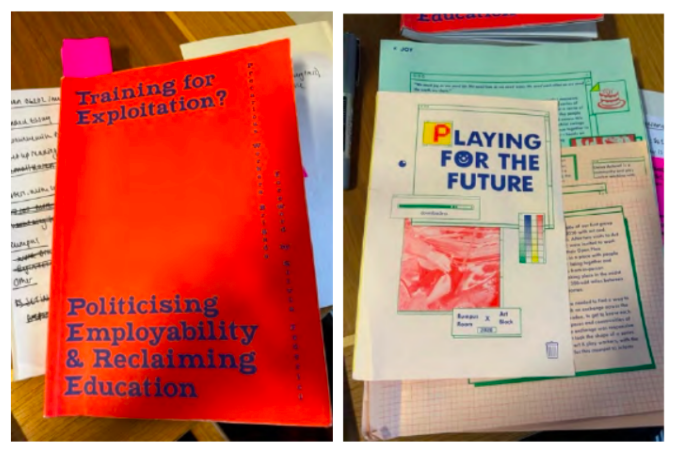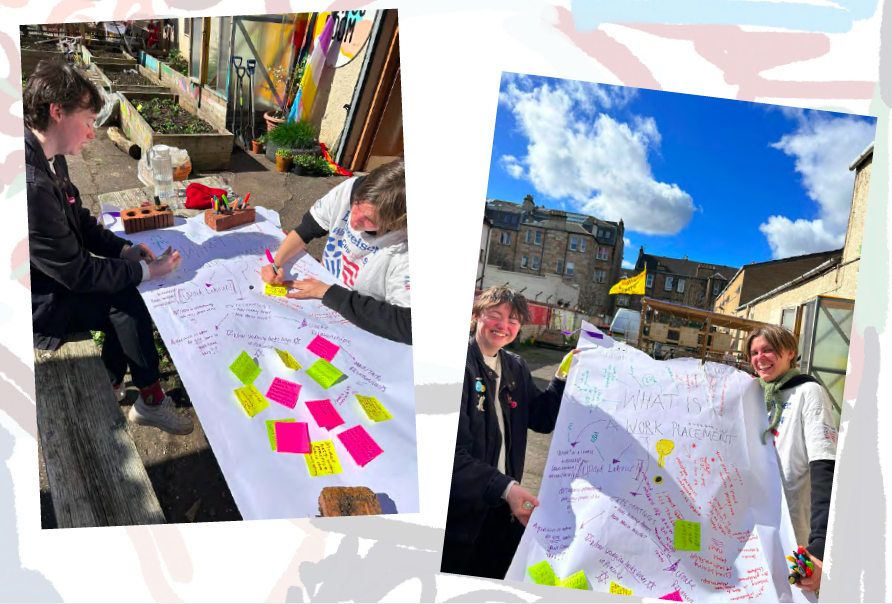By Rosie Coleman Collier –
Currently on the MLitt programme in Curatorial Practice at Glasgow School of Art, my own research and curatorial work has been exploring how community practices and arts organisations can inform considerations on care, dependencies, labour, support, relations and intimacy. As part of my MLitt we can undertake a work placement; it was decided that my own values and interests aligned with those of Rumpus Room (RR), and we would collaboratively work together to shape a work placement that was mutually beneficial to both the development of my own research and the work of the organisation.
At the start of the work placement I met with Nadia to discuss my own research interests, curatorial practice and intentions for the placement. In our first meeting we chatted about the reality of the work placement as something you are required to do as a student for accreditation: What are the complexities associated with the work placement? What is the value of this form of unpaid labour? How do you actually benefit from the work placement? How can organisations avoid work placements becoming extractive forms of unwaged labour? Why are we asked to do work placements and what do they tell us about our current social and economic climate?
Thinking about the ways in which my work placement could be formed as a reciprocal exchange, one where I benefit from the experience and Rumpus Room are gaining something from my presence in the organisation, we decided I would use my time here to work on an independent research project, developing a framework for Rumpus Room to consider ethical caring practices across work placements, something they hold throughout the year. The idea was that this framework would be used for Rumpus Room to adhere to when hosting and supporting work placement students in the future, whilst I was been given time and resources to engage with a research project that would directly contribute to my own independent research on caring labour practices.
Beginning to work on this guide on ethical work placements, I undertook various types of research. Some of this was through reading publications and making notes, on books such as the Precarious Workers Brigade’s Training for Exploitation and RR’s own Playing For the Future. As well as research via reading and writing, I engaged in various discursive activities. I hosted conversations with my own academic placement convenor Alexandra Ross to gain a range of perspectives on the work placement experience, and facilitated a workshop on ethical work placements with Leo (also on a work placement at Rumpus Room), and Ardis who has done a work placement in a similar form. In this workshop we collaboratively reflected on what makes an ethical placement, and as a group put together an ethical ‘code of conduct’ for work placements that Rumpus Room will adhere to moving forward, and can be used as inspiration for other organisations to shape their own work placement programmes.

Building on the workshop, we sent the draft text of what will soon become Cultivating Interdependence and ethical code of conduct to Tarka and Dylan, who both have done placements at Rumpus Room in the past. Along with Leo and Ardis, they offered anecdotes of their own experience of the work placement at RR. Integrating these voices through sharing materials, anecdotes, ideas and suggestions, allowed for the zine to become a collaborative and mutual piece of work, that both reflects upon and includes a constellation of experiences, opinions and perspectives. Cultivating Interdependence was shaped by the coming together of these interdependent relationships, working alongside each other and encouraging a pause to reflect on how a work placement could and should look. My relationship with Nadia is another example of an interdependent relationship that lies at the core of the production of the zine. She was nurturing throughout the process, sharing resources with me, reading and commenting on draft text and supporting on design for the final publication.

The decision to present this guide to ethical placement as a zine publication was shaped by reading the report ‘Structurally ‘F’cked’ published at the time of writing. In the foreword to the report, Lola Olufemi talks of the value of an ‘artist-led collaboration’ in the form of a free to download PDF that includes a toolkit with extensive information, advice, and links to resources for support. This is precisely how I wanted Cultivating Interdependence to be shaped and distributed; as an open resource that offers support, fosters collaboration and combats ‘feelings of alienation’.*(1)
As the publication enters wider distribution networks it will not only be of benefit to RR, but also disseminated as a helpful resource across arts organisations and universities to facilitate dialogue and promote ethical, critical practices across work placement programmes. This work therefore has the potential to make a wider contribution to discourses on labour, unpaid work and the effects of neoliberalism on Higher Education, in an accessible and open format.
Being given the time and resources to undertake this research into ethical work placements at RR has been invaluable to the development of my work outside of this work placement. My time at Rumpus has given me more than just ‘work experience’ or transferrable skills for a CV, but rather has made a genuine contribution to the development of my own independent curatorial practice. It has offered me frameworks, language, materials and resources that will bolster my own independent curatorial work moving forward, generating thinking on how genuine caring practices evolve through approaches that centre relationships and allow interdependencies to unfold. It has offered consideration into how I wish to work with and alongside others, as well as providing me with a support network that will both guide and nurture future work.
I am grateful for Rumpus Room for hosting me, and for the time spent at RR that has enabled me to recognise how it is the relationships we have in how we work together, the dependencies, attachments, friendships of solidarity that are important to allowing creative work to evolve. I am grateful to Nadia, Leo, Ardis and Rachel for their warmth, support and kindness, autonomy and trust in hosting me at RR, and for giving me the space, time and resources when on an unpaid placement to reflect upon the nature on the socioeconomic context and politics of this type of work.
*(1) Lola Olufemi, ‘She wants to make something’ in Structurally F-cked Inquiry (March 2023), < https://www.weindustria.org/> [accessed 15 March 2023] (p. 8)
You can view ‘Cultivating Interdependence: An ethical guide to work placements at Rumpus Room’ via our issu page or download it direct from our linktree or buy a printed copy from our shop. Please use it and share it!